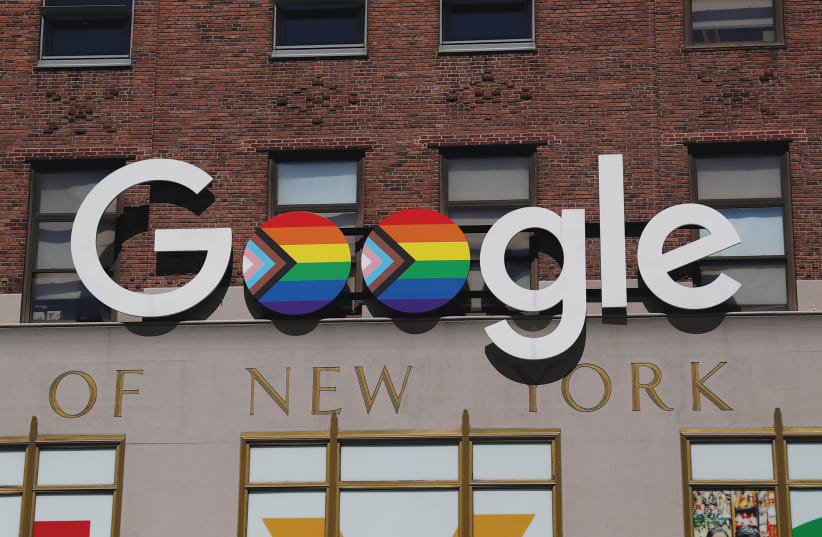Anti-Israel activists protesting Google contracts with the Israeli government by occupying the technology giant’s office in New York City and Sunnyvale for several hours on Tuesday, were arrested and put on administrative leave, according to a Google spokesperson.
Protesters were arrested by police officers after refusing to leave Google Cloud CEO Thomas Kurian’s Sunnyvale office or New York City Chelsea workspace for almost 10 hours. The sit-in protests were live-streamed by the No Tech for Apartheid activist movement, which claims to represent technology company employees against business with the State of Israel.
“Physically impeding other employees’ work and preventing them from accessing our facilities is a clear violation of our policies, and we will investigate and take action,” a Google spokesperson said. “These employees were put on administrative leave and their access to our systems was cut. After refusing multiple requests to leave the premises, law enforcement was engaged to remove them to ensure office safety.”
View this post on Instagram
The occupations of Google workspaces were joined by demonstrations outside the premises and in Seattle. The chief demand of No Tech for Apartheid, a project by Jewish Voice for Peace and Linda Sarsour’s MPower Change, was the cancellation of the Project Nimbus contract and cessation of business with the Israeli government. No Tech For Apartheid claimed that Google’s technology was being used to support occupation and a so-called genocide in Gaza.
“We cannot stand against Google’s power unless we hit them where their principles are – that principle is maximum profit and all we have against it is our labor,” said an activist in Party for Socialism and Liberation Bay Area Tuesday social media video of a protest.
Another activist said “As tech workers we’re in a unique position to put internal pressure on our employers and throughout the industry.”
Who were the protesters?
The Google spokesperson said that only a few of the activists were actually employees.
“These protests were part of a longstanding campaign by a group of organizations and people who largely don’t work at Google,” said the Google spokesperson. “A small number of employee protesters entered and disrupted a couple of our locations.”
No Tech For Apartheid has long been rallying against business between Israel and Google, and in particular against Project Nimbus, which was awarded to Google and Amazon in 2021, beating out bids on the project from Microsoft, Oracle, and IBM.
Soon after, Google and Amazon workers published an open letter condemning the program to provide a comprehensive cloud service for the government, the national defense system, and other bodies in the Israeli economy. As part of the project, the tech giants were tasked with establishing cloud-based data centers in a plan to move a majority of the government’s IT infrastructure to cloud-based servers. The anti-Israel activists also began a petition against the project, which had amassed 94,305 signatures by Wednesday.
Alphabet stockholders voted at a 2022 annual stockholders meeting against a proposal presented by Google employee and No Tech for Apartheid leader Gabriel Schubiner to assess the company’s role in Project Nimbus. The Alphabet board of directors had also recommended voting against the proposal.
No Tech for Apartheid said in its Tuesday demands that Google was harassing, intimidating, and censoring Palestinian, Arab, Muslim Googlers, and that they address what they said was a “major health & safety workplace conditions issue” created by the project.
“Multiple workers have quit citing the serious mental health consequences of working at a company that is using their labor to enable a genocide,” No Tech for Apartheid said its website manifesto. “We demand that Google stop the retaliation against and doxxing of workers speaking out, and create a safe working environment for all workers.”
Ariel Koren, another Google employee and No Tech for Apartheid leader, quit the company alleging that other Jewish employees had created a toxic work environment against her views and that Google had retaliated against her by relocating her position to Sao Paulo, Brazil.
Eddie Hatfield, who according to No Tech for Apartheid addressed protesters outside the Chelsea Google office, was fired in March after interrupting Google Israel CEO Barak Regev at an Israeli tech industry conference in New York City.
He was escorted out of the conference to boos and jeers while making a speech against Google’s collaboration in Project Nimbus. A JVP (Jewish Voice for Peace) activist was also removed from the hall for interruptions, according to the anti-Zionist organization.
No Tech for Apartheid’s opposition has only intensified with an April 12 New York Times report that in March Google drafted a contract for consulting on allowing multiple units access to automation technologies. The report also indicated that the Defense Ministry had a secure entry point into Google Cloud to store and process data and access artificial intelligence services.
Benzi Gad contributed to this report.

